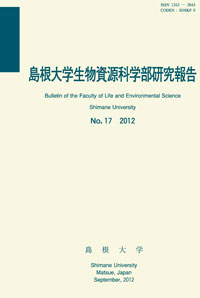島根大学生物資源科学部
ISSN:2435-0885(online)
ISSN:1343-3644(in print)
A publication of this bulletin in print format has not been made since no 24.
ISSN:1343-3644(in print)
A publication of this bulletin in print format has not been made since no 24.

number of downloads : ?
Use this link to cite this item : https://ir.lib.shimane-u.ac.jp/3567
Bulletin of the Faculty of Life and Environmental Science Shimane University 1
1996-12-20 発行
中国における国境貿易に関する研究 : 中国・ミャンマー国境貿易の事例を中心に
A Study of the Border Trade in the South-Western China : With emphasis on the border trade between China and Myanmar
Li, Xiaojin
File
Description
The border trade between China and its neighboring countries has recently become an important factor in the reformation of its market economy. Comparing with international trade that is lead by the central government, the traditional and regional backgrounds as well as its border trading methods have several advantages. China has three main trade areas. In the south-western part especially, the border trade between Yunnan district and Myanmar became the largest border area in China. This paper will try to analyze the background of this area trade development as well as its significance to the recent economic and social conditions.
Based on the result of survey, China imports materials and resources from Myanmar, and exports light industry products. The advantage on trade which the Yunnan district posseses, has several favorable effects such as :1)By developing border trade, the local government can acquire income duties and open investments in order to establish improved industrial and trade equipment.
2)through the special method of a㏄ount settlement using the China domestic currency, the trade income will not be affectea by the fluctuation of the foreign exchange. 3)A trading route for a new market for low and medium level industrial products which are difficult to find the domestic market area, will be made available. These are the unique characteristics of this border trade area and is very important strategy to develope the chinese industries.
中国の国境地域は,歴史的,自然的,地理的なことが原因になって,産業基盤が弱く,従来から貧困な地域であり,沿海地域と比べると,大きな経済格差が存在している.特に,70年代末に改革開放期に入ってから,政府は経済建設の重点を沿海部においたため,投資も沿海地域に集中した また,市場経済の建設のために,沿海地域では経済改革を先行しておこなわれた.その結果,「経済特区」・「ハイテク開発区」の設立,対外貿易,外資導入の権限拡大などは,いずれも沿海部のみで実施された.結局,この沿海地域に偏った改革開放政策によって,国境地域と沿海地域の経済格差はますます拡大してきた.80年代後半に入り,改革開放の深化に伴って,政府は国全体の開発戦略について,従来の沿海偏重を改め,単一路線的な「沿海開放」政策のかわりに,「三沿(沿海・沿江・沿辺)開放」という全方位対外開放の戦略を打ち出し,国境貿易はその中の「沿辺開放」の構成部分として重視され始めた
近年来,国境貿易は,国境地域の経済振興及び地域間の経済格差の是正に,積極的な役割を果たしている.特に,対外開放政策の進展とともに,国境貿易の規模と範囲も拡大しつつあり,単純な商品貿易から経済協力と経済開発の方向へ発展し,補償貿易・技術貿易・合弁経営・国外への直接投資・労務合作など,より深く関連する形態も出現させている.そして,国境貿易の目的は,互いに有無を通じ合うとか,過剰と不足を調節するとか,地元住民と経営者自身の生産・生活を満足することだけではなく,商品の高付加価値化と高収益性を実現することである.更に,国境貿易を通じて,全国の産業構造の調整と経済の均衡ある成長を促進できるようになった.国境貿易の発展は,中国の「三沿開放」戦略の中で重要な課題になったのである.本論文では,雲南省徳宏州における中国・ミャンマー国境貿易の事例をもとにして,こうした国境貿易の展開及び現状を明らかにした上に,国境貿易と内陸国境地域の経済振興の視点から,その意義と今後のあり方について検討する.
Based on the result of survey, China imports materials and resources from Myanmar, and exports light industry products. The advantage on trade which the Yunnan district posseses, has several favorable effects such as :1)By developing border trade, the local government can acquire income duties and open investments in order to establish improved industrial and trade equipment.
2)through the special method of a㏄ount settlement using the China domestic currency, the trade income will not be affectea by the fluctuation of the foreign exchange. 3)A trading route for a new market for low and medium level industrial products which are difficult to find the domestic market area, will be made available. These are the unique characteristics of this border trade area and is very important strategy to develope the chinese industries.
中国の国境地域は,歴史的,自然的,地理的なことが原因になって,産業基盤が弱く,従来から貧困な地域であり,沿海地域と比べると,大きな経済格差が存在している.特に,70年代末に改革開放期に入ってから,政府は経済建設の重点を沿海部においたため,投資も沿海地域に集中した また,市場経済の建設のために,沿海地域では経済改革を先行しておこなわれた.その結果,「経済特区」・「ハイテク開発区」の設立,対外貿易,外資導入の権限拡大などは,いずれも沿海部のみで実施された.結局,この沿海地域に偏った改革開放政策によって,国境地域と沿海地域の経済格差はますます拡大してきた.80年代後半に入り,改革開放の深化に伴って,政府は国全体の開発戦略について,従来の沿海偏重を改め,単一路線的な「沿海開放」政策のかわりに,「三沿(沿海・沿江・沿辺)開放」という全方位対外開放の戦略を打ち出し,国境貿易はその中の「沿辺開放」の構成部分として重視され始めた
近年来,国境貿易は,国境地域の経済振興及び地域間の経済格差の是正に,積極的な役割を果たしている.特に,対外開放政策の進展とともに,国境貿易の規模と範囲も拡大しつつあり,単純な商品貿易から経済協力と経済開発の方向へ発展し,補償貿易・技術貿易・合弁経営・国外への直接投資・労務合作など,より深く関連する形態も出現させている.そして,国境貿易の目的は,互いに有無を通じ合うとか,過剰と不足を調節するとか,地元住民と経営者自身の生産・生活を満足することだけではなく,商品の高付加価値化と高収益性を実現することである.更に,国境貿易を通じて,全国の産業構造の調整と経済の均衡ある成長を促進できるようになった.国境貿易の発展は,中国の「三沿開放」戦略の中で重要な課題になったのである.本論文では,雲南省徳宏州における中国・ミャンマー国境貿易の事例をもとにして,こうした国境貿易の展開及び現状を明らかにした上に,国境貿易と内陸国境地域の経済振興の視点から,その意義と今後のあり方について検討する.
About This Article
Other Article
PP. 45 - 50
PP. 51 - 56
